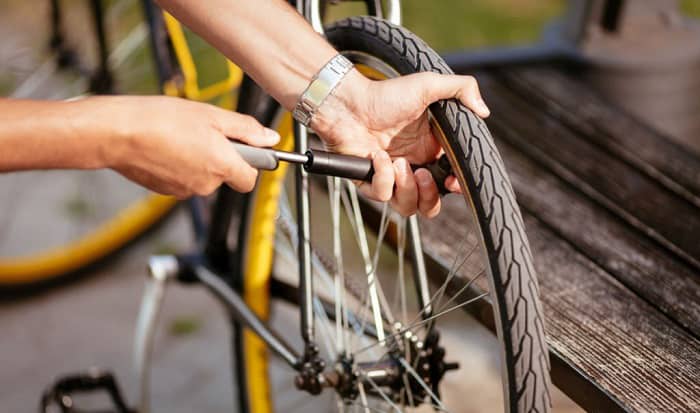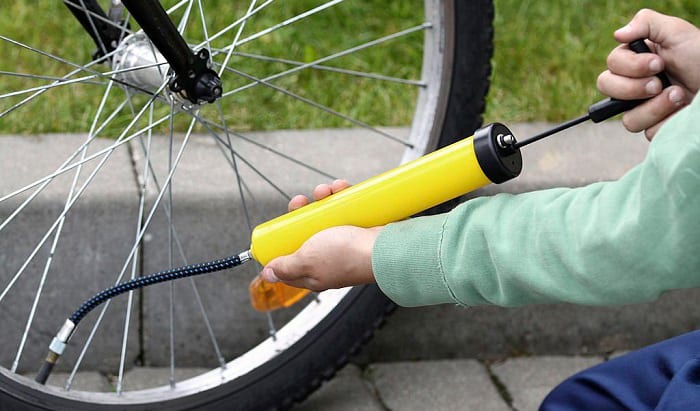Most of the time, you can pump your bike tires in the comfort of your garage or a nearby bicycle shop using either a static floor pump or a portable mini-pump.
However, suppose you like biking in the great outdoors, especially on natural, isolated terrains, where there are no nearby places to pump up a bike tire. In that case, it will be very dangerous if you have accrued a deflated bike tire. This will make your cycling trip a disaster instead of a fulfilling activity.
Therefore, learning how to pump a bike tire without a pump is important know-how for nature cycling enthusiasts. Read on below.
Table of Contents
How to Put Air in Bike Tires Without a Pump?
First Method: Using a CO2 Cartridge
This method is the most popular for cycling enthusiasts due to its simplicity.
One drawback of this method is that this is a temporary fix, and real air must be pumped as soon as possible because CO2 disappears quickly.
What you will need
- CO2 cartridges
- An inflator head
Steps for putting air in bike tires using a CO2 cartridge
Step 1. Remove the dust cap
There is a dust cap to avoid mixing dust and particles with pressurized air in the bike tire. So, simply remove it and put it in a safe place.
Step 2. Check the Tire then Connect the Inflator Head to the Cartridge
Check the Tire and tube to see if they still work before inflating. After that, connect the inflator head to the CO2 cartridge neck.
- If you have a threaded cartridge, thread it until you feel a point of resistance.
- If you have a non-threaded cartridge, push it until you feel resistance. You should NOT push it more than this because it releases the high-pressure air from the canister.
Step 3. Remove the Inflator Head from the Valve
Carefully remove the inflator head from the bicycle valve to avoid excess air leaking from the tire.
Step 4. Return the dust cap
Retrieve the dust cap that you removed in the first step. Please put it back on the tip of the valve.
Cover the tip until there is no more space between the tip of the dust cap and the bicycle valve. Then, you are good to go.
Second Method: Manual Pumping
If you have no pumping equipment (e.g. CO2 canister, mini-pump, etc.), one way to pump up a bike tire is simply to do manual pumping. This method requires you to use your mouth as an inflator.
This may not be hygienic, but it is a viable method and may save your tire and your biking adventure. However, this is also a temporary fix.
What you will need
In order for you to pump air into a bike tire with this method, you only need a clean cloth or your shirt to clean the valve.
Steps for putting air on the bike using Manual Pumping
Step 1. Remove the dust cap
Simply remove the valve cover and put it in a safe place.
Step 2. Clean the valve
Clean the parts of the valve that will be in contact with the mouth using a clean cloth or your shirt.
Step 3. Pump Air into the valve using your mouth
Start the process by blowing a little air into the tire from the bicycle valve. After that, check if the tire is aligned with the rim. If not, make sure to adjust it to achieve the correct position.
After the initial pump, simply continue the process until reaching the proper pressure and blow up the tire.
Step 4. Return the dust cap
Put back the dust cap to the tip of the valve.
Cover the tip until there is no more space between the tip of the dust cap and the bicycle valve.
Third Method: DIY Pumping
If you have no pump but some tools and equipment in your vicinity, a DIY pumping method may suffice.
What you will need
- Source of pressurized air – this may be dry ice, an old tire, or a non-flammable gas canister.
- Valve adaptor
Steps on DIY Pumping
Step 1. Remove the dust cap
Step 2. Connect your valve adaptor to the pressurized air source
This step requires thinking because an air leakage must be avoided. Make sure that the adaptor is an exact interface to the mouth of the pressurized air source container.
Step 3. Connect the valve adaptor to the tire valve
If the adaptor is placed correctly, the air transfer will start. Continue putting air into the tire until the desired tire pressure is obtained or the pressurized air source is depleted.
Step 4. Remove the valve adaptor the tire valve
Carefully remove the valve adaptor. It is important to make sure the removal process clamps the tire valve seal to avoid air leakage.
Step 5. Return the dust cap
Cover the tip until there is no more space between the tip of the dust cap and the bicycle valve.
Conclusion
The most common methods on how to pump a bike tire without a pump are described in this article. Follow the steps carefully not to blow up a bike tire.
If you understand the different methods to inflate a bike tire without a pump and the steps for each method that are explained in this article, you can bike wherever without a problem. Do you find the article helpful? Feel free to share the article with those who need the guide.

“I ride my bike to work for years, but is that enough? Our carelessness towards our surroundings has taken a toll on the environment. And now, everyone is responsible for changes; even the most minor contribution is counted. With this hope and spirit, I started with my partner to establish Biketoworkday to help more individuals commute to their work sites on their bikes.”


